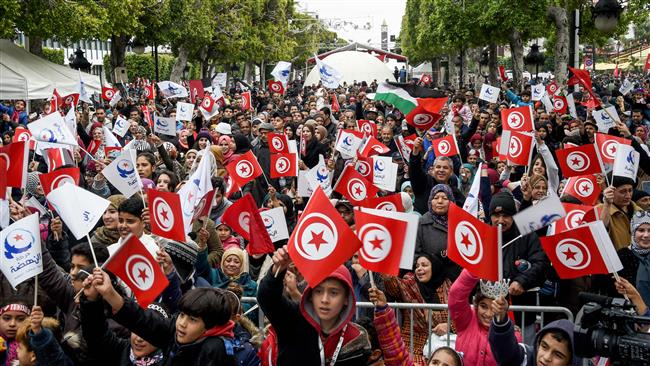Tunisia’s powerful union to elect new chief
Tunisia’s General Labor Union (UGTT) has opened a key annual congress to debate its strategy and pick a new chief.
The Nobel Peace Prize-winning UGTT, known to many Tunisians for the role it played in the country’s historic revolution of 2011, convened the meeting on Sunday to replace Houcine Abassi, who took office just months after the fall of former strongman Zine el Abidine Ben Ali.
Some 500 delegates, representing more than half a million members of the labor union, attended the congress. Abassi’s deputies Bouali Mbarki and Noureddine Taboubi were highly favored to fill the union’s leadership role. During the meeting, the 69-year-old Abassi called on his successor to "continue on the same path of militancy."
The UGTT has been a major force in Tunisia’s post-revolution transition, a rare success story which inspired many in the Arab world. The activist group played an important part in a 2013 national dialogue that many described as Tunisia’s way out of a potentially serious crisis. The UGTT won the joint award for the Nobel Peace Prize in 2015.
Some former members of the union are currently serving in the cabinet of Prime Minister Youssef Chahed. However, the union has never ceased its activism on labor rights issues in Tunisia. A decision to freeze wages of the public sector employees in autumn prompted the UGTT to threaten the government with a nationwide strike.

Moroccan port workers protest Maersk ship carrying F-35 parts to Israel

US approves potential sale of Stinger missiles to Morocco

Morocco calls for boycott of Maersk ship over arms deliveries to Israel
VIDEO | Press TV's news headlines
Iran more than halved its power grid losses to 10% in 16 years: Expert
Abbas names likely successor in move deemed ‘illegitimate, divisive’
Illegal Israeli settlers attack Palestinian school in occupied West Bank
VIDEO | Israeli forces tighten siege on Jenin refugee camp
Iran restores operations at its largest container port after explosion
Leader offers condolences over ‘painful’ port blast in southern Iran
VIDEO | Yemeni army attacks sensitive Israeli military sites with ballistic missiles










 This makes it easy to access the Press TV website
This makes it easy to access the Press TV website